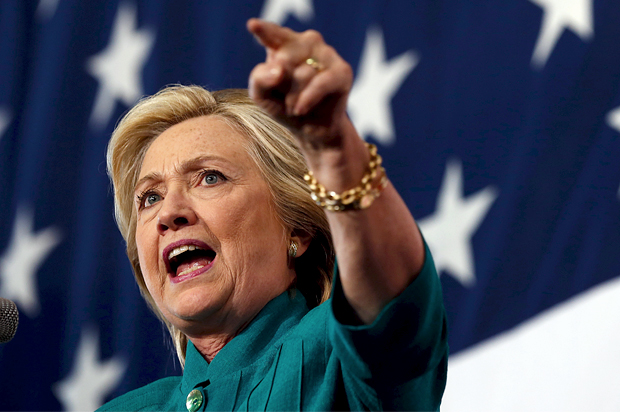The Hillary Clinton email story is maddening. It’s powered by the assumption of wrongdoing on Clinton’s part in how she handled her electronic communications while secretary of state – an assumption that is not supported by available evidence. At the same time, it’s extraordinarily difficult to prove or disprove anything given that Hillary herself has exerted complete control over the available information – her team decided which of her emails were relevant to her official business as secretary, and they discarded the rest. In the absence of concrete information, people fill in their own conclusions and allow their existing biases to guide their reasoning. The end result is everyone behaving terribly towards everyone else because that’s all they know how to do.
That brings us to last week’s New York Times “bombshell” about two inspectors general asking the Department of Justice to open up a criminal investigation into whether Hillary Clinton “mishandled” sensitive information in her emails. The story was quickly updated to clarify that the requested investigation wasn’t regarding Clinton herself, but rather the broader question of whether classified info was mishandled. Then came news that the requested investigation was not criminal in nature. The Times had screwed up, and it posted a correction that placed blame for the error on anonymous “senior government officials” who had provided erroneous information on the DOJ referral.
Obviously we don’t know who those “senior government officials” are, but there are some reasonable suspects. The Democrats on the House Select Committee on Benghazi seem convinced that their Republican counterparts are to blame. “The leak of the Inspector General’s referral, and the mischaracterization that accompanied its leak, demonstrate once again how the Select Committee on Benghazi has lost sight of its mission and become little more than the taxpayer funded effort to attack Secretary Clinton,” Rep. Adam Schiff said in a statement. (If it did originate from the Benghazi committee, that wouldn’t be a surprise, given that chairman Trey Gowdy has effectively given his colleagues and staff a green light to leak.) Of course, the only way to know for sure would be if the Times were to burn its sources – something it’s unlikely to do, even though it would seem to be justified.
The erroneous leak to the Times was the second time this month that a media outlet got taken in by an anonymous source within the government leaking inaccurate information about Hillary’s emails. Politico had to update a story it published in early July on Clinton’s communications with longtime confidant Sidney Blumenthal because their source had badly mixed up email chains and wrongly claimed that Hillary had withheld an email from investigators. These two incidents are part of a longstanding pattern of bad behavior when it comes to leaking inaccurate information about official communications linked to the Benghazi investigation.
It shouldn’t come as a surprise that there are people within the government who would abuse their access to information to try and create political problems for the likely Democratic presidential nominee. What’s maddening is that members of the press keep lunging at the bait, even after seeing so many of their colleagues get hooked. That, in turn, only encourages disreputable actors within the government to keep going on fishing expeditions – they know someone will bite and they know that someone else will take the blame for disseminating false information.
And really, anyone who’s interested in accountability and transparency when it comes to the Clinton emails would be better served by showing a bit more skepticism when stuff like this is dangled in their faces. Buried beneath all the inaccurate and sensationalist claims about Hillary facing a criminal inquiry is an interesting story: the inspectors general argue that Hillary, her assertions to the contrary notwithstanding, did in fact transmit classified information via her personal email. There are, of course, several unanswered questions and potential mitigating factors in play – the emails themselves were apparently never marked as containing classified information, and a State Department official told Time magazine that “retroactive classification” of the emails “does not mean Clinton did anything improper.” But all the sloppy reporting about the focus of the investigation and the nature of the inquiry allow the Clinton campaign to argue – with justification – that they’re being treated unfairly.
But that’s just not how the press functions when covering the Clintons. Jumping all over news of a criminal inquiry that turned out to be inaccurate would seem to be a great opportunity for reporters and pundits to reevaluate how they process news about Hillary. Instead, we get columns like this one from Ron Fournier, in which he argues that there should be a criminal inquiry because obviously a crime was committed. That doesn’t align with what the officials investigating Hillary’s emails recommend, but whatever. She’s a Clinton, and that’s enough to convict.

